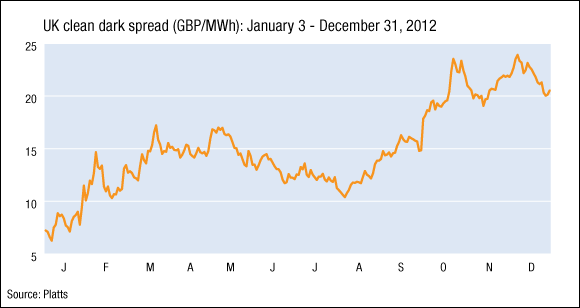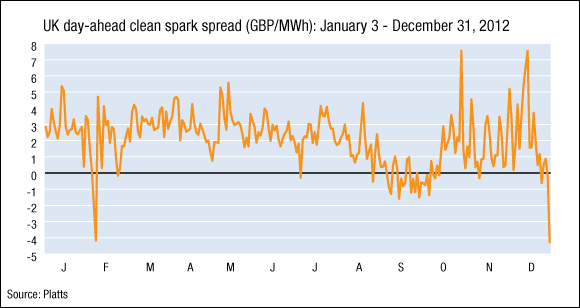Coal-fired power dominates UK generation mix
By Jillian Ambrose in London
UK electricity generation shifted further from gas-fired power towards coal-fired generation in 2012, a trend that looks set to continue in 2013 as rising gas prices erode the profits of combined cycle gas turbine use -- allowing coal burn to soar in line with falling fuel and emissions allowance costs.
In addition, growing renewable energy capacity has increased the variability of the energy mix due to the intermittent nature of wind generation to allow for a year of record lows and highs for gas-fired power as well as oil-fired generation late in the year.
Official figures from the UK's Department of Energy and Climate Change showed that gas burn had fallen 40.9% to 22.83 TWh by the third quarter of 2012, paving the way for ever higher year-on-year coal burn.
Coal-fired power rose by 49.9% from the same quarter the previous year to 28.66 TWh in Q3, on the back of favorable clean dark spreads -- the difference between the price of power and the cost of coal and carbon. (See related chart: UK clean dark spread (GBP/MWh): January 3 - December 31, 2012).
Clean dark spreads rockets 171%
The Platts clean dark spread assessment measures the profitability of month ahead power generation produced at a 35%-efficient coal-fired power plant and shows steadily growing incentive for generators to turn to coal-fired power.
In January 2012 the average clean dark spread price was GBP8.21/MWh according to Platts data, with prices climbing higher month on month to almost double by May when the assessment averaged GBP15.35/MWh.
By December 24, the month-to-date average clean dark spread assessment was GBP22.30/MWh, up 171% from the average price in January, Platts data shows.
Cheap European coal and even cheaper EU Emissions Allowances have been key factors driving the increase of coal-fired power generation, market sources told Platts.
Gas generation hits 14 year lows
The Platts clean spark spread assessment -- measuring the profitability of day-ahead gas-fired generation for power plants at 50% capacity -- was assessed at a fraction of the value of coal-fired generation in 2012 averaging between GBP1.50/MWh and GBP3.20/MWh over the first half of the year.
The year-to-date average price for the Platts clean spark spread was GBP2.52/MWh August 31 but plunged to just GBP0.29/MWh in September, contributing to record low gas-generation levels over the month.
On September 28, UK gas-fired power generation crashed to 14 year lows amid a perfect storm of uneconomic spark spreads, strong winds and typically lower Friday power demand.
Gas flow analysts at Bentek, a unit of Platts, confirmed that gas nominations from the UK's power generation sector were just 8 million cubic meters, the lowest since Bentek began collating data at the beginning of 2008. This fell dramatically short of the average month-to-date daily
nomination for September 2012 of 27 million cu m/day and the September 2011 average of 59 million cu m/day.
Shortly before midday September 28, gas generation was pegged at just 5.6 GW, or 14.1% of the total generation mix, while coal-fired power dominated at almost 50% of the mix at 19.2 GW.
World’s largest wind farm boosts output
The record lows for gas generation were set amid strong wind power generation of 3.5 GW shortly before 12:00 BST (1300 GMT) and followed just weeks after the start of the giant 500 MW Greater Gabbard Offshore wind farm in UK waters.
At the time, the Greater Gabbard project was the world's largest offshore wind farm but it was ousted from its position as the world's largest by the London Array project in October, paving the way for a string of wind generation records through November.
The London Array offshore wind project exported electricity to the UK power grid for the first time at the end of October as part of its initial 630 MW capacity phase.
The 175 turbine first phase of the project, based 20 kilometers off the southeast coast of England in the Thames Estuary, was expected to be completed by the end of the year, in line with its construction schedule, but had already produced electricity from the 152 turbines currently in place.
As a result of the increased wind capacity November saw a flurry of three successive wind generation records settling just above 4.5 GW November 20.
Oil-fired power hits 2 year highs
But in December, reduced wind generation levels combined with unplanned nuclear outages and rising winter demand boosted gas-fired generation to test record highs for the year and forced the UK to resort to levels of oil-fired generation not seen in two years.
Oil-fired power ramped up over the afternoon of December 12 to reach 1.2 GW, or 2.3% of the total generation mix at 1500 GMT, the first time it has moved beyond the 1 GW mark since December 2010, according to Platts Powervision data.
The move to more expensive oil-fired power was believed to have a direct impact on the UK's within-day electricity market, as power for delivery December 12 between 1700 GMT and 1900 GMT was heard trading at GBP258/MWh, more than four times the December 11 day-ahead price of GBP54.65/MWh.
At 1600 GMT, gas-fired generation reached 20.5 GW or 36.9% of the generation mix, narrowly missing the year's highest gas-generation contributions so far at 22.351 GW seen February 3, while coal-fired power stood just slightly higher at 23.2 GW.
Just a week previously, coal had dominated the generation mix at 22.4 GW while gas-fired power contributed just 13.5 GW.
However, as day-ahead baseload power prices lifted over 10% and the UK's NBP gas market turned bearish amid an oversupply of gas, clean spark spread prices rocketed to just over three times the year-to-date average, Platts data shows, supporting greater gas burn.
The day-ahead clean spark spread surged to GBP6.5689/MWh for power plants at 50% efficiency, in stark contrast to the November average price for the day-ahead clean spark spread of just GBP1.88/MWh.
© 2012 Platts, The McGraw-Hill Companies Inc. All rights reserved. To subscribe or visit go to: http://www.platts.com

